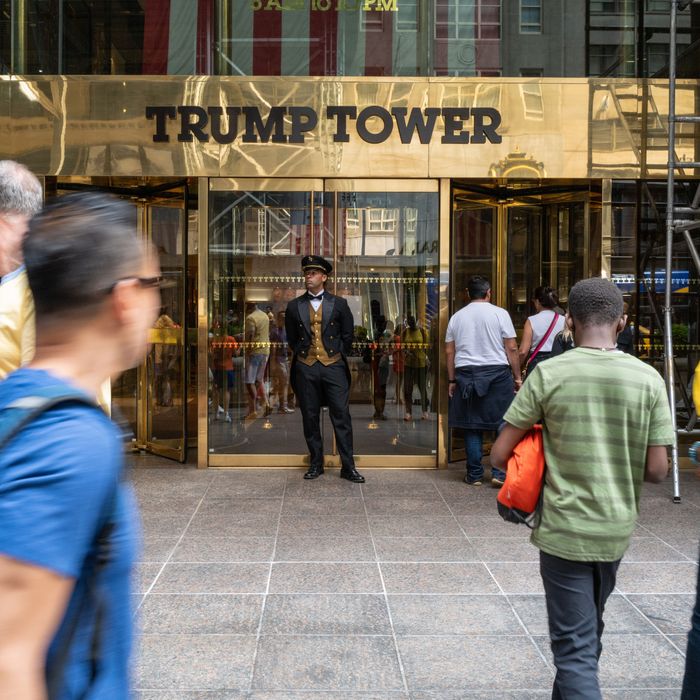
As of Tuesday afternoon, Donald Trump’s company is a convicted felon. The result comes courtesy of the jury in the criminal trial of the Trump Organization, which found Trump’s namesake company guilty on all 17 counts of the indictment.
The result is significant but not exactly surprising. The Trump Organization was indicted by the Manhattan District Attorney’s Office in the summer of 2021 along with the company’s chief financial officer, Allen Weisselberg, over a yearslong scheme to avoid paying taxes on compensation and benefits that Weisselberg received. Weisselberg pled guilty in August, which, given the way that corporate criminal liability works, dramatically simplified the case. (He promised to serve a five-month jail term.)
Ordinarily, a corporate defense in this scenario would face extraordinarily long odds, and most companies (at least the ones with competent counsel and non-crazy clients) would have settled. That is because corporations are typically criminally liable for the criminal activities of their employees, assuming that the conduct at issue was intended — at least in part — to benefit the company. Once you have a guilty plea from a corporate employee, the company has very limited remaining lines of defense. You can accuse the employee of lying to save himself, perhaps, or try to argue that the conduct was not intended to benefit the company, but these are generally not great arguments.
The Trump Organization’s lawyers reportedly pushed hard to argue that Weisselberg was acting solely in his self-interest — purely to lower his personal tax liability — but this made almost no sense in the context of the particular criminal scheme here. That is because if Weisselberg simply wanted more money, he could have lobbied for a higher salary, but the scheme he and others at the company settled on saved both him and the Trump Organization money. As one of the prosecutors explained, this was “by far the most significant benefit” to the company, which paid Weisselberg less as he managed to net about a million dollars over the course of the scheme. According to the DA’s office, the company would have had to pay about $3.5 million if Weisselberg’s benefits had been accurately reported to tax authorities.
Corporations cannot be imprisoned, so the principal sanction against the company will be a fine — and not a particularly large one. Under New York law, the potential fine tops out at around $1.6 million, so this is not exactly going to bring the company down. The Trump Organization will presumably appeal, but its odds of success are very low.
Even setting aside the underlying legal issues and dynamics, I knew Trump’s company was in serious trouble when I first read that the trial team included several lawyers who defended Trump in his second impeachment proceeding. This meant that one of Trump’s lawyers was Michael van der Veen — the guy who made himself a literal national laughingstock when he told the U.S. Senate that it would have to go to his office in “Philly-delphia” for depositions if witnesses were going to be presented. This was roundly (and justifiably) mocked, but it was just one part of an incredibly bizarre and ineffective defense that only “worked” because the vast majority of Republican senators were evidently prepared to support Trump regardless of what was offered up on his behalf. I was not in attendance at the Trump Organization trial (mercifully), but based on the coverage, the company’s defense was replete with similar bungling and clunky theatrics. The defense called just two witnesses, but according to Reuters, the testimony from one of them “appeared to backfire on the defense and bolster the prosecution’s case,” which is generally something to avoid.
During closing arguments, one of the lawyers showed the jurors testimony that included lines of questioning that were successfully objected by prosecutors, a major no-no. Van der Veen himself told jurors that Weisselberg was not to be trusted because “prosecutors had him by the balls” — a turn of phrase that the New York Times could not even publish but one that seemed to presume that the New Yorkers on the jury were somehow so stupid that they could be swayed by a crude colloquialism.
Van der Veen requested a mistrial at one point after a series of objections during closing arguments, which, according to the Times, visibly annoyed the jurors, “with a few shaking their heads and glancing at their watches.” (Also something to avoid!) The lawyers were also repeatedly reprimanded by the judge for misstating the law, did weird impressions of witnesses, and made strange puns. When it was van der Veen’s turn to deliver his closing, he “approached the lectern, paused and then shouted: ‘Weisselberg did it for Weisselberg’” — an apparent and now clearly failed effort to devise a catchphrase for the main defense theme, but one that could probably have been delivered effectively without shouting at the people you are trying to persuade.
Granted, these people did not have much to work with, but there is respectable lawyering and then there is buffoonery, and this was not respectable lawyering.
This was not the crime of the century. Had Trump not been involved, the company may never have been charged for the conduct at issue given the relatively paltry amounts at issue for a corporate criminal case. Still, the verdict has to grate for a man who once styled himself and his company as icons of New York business.






























